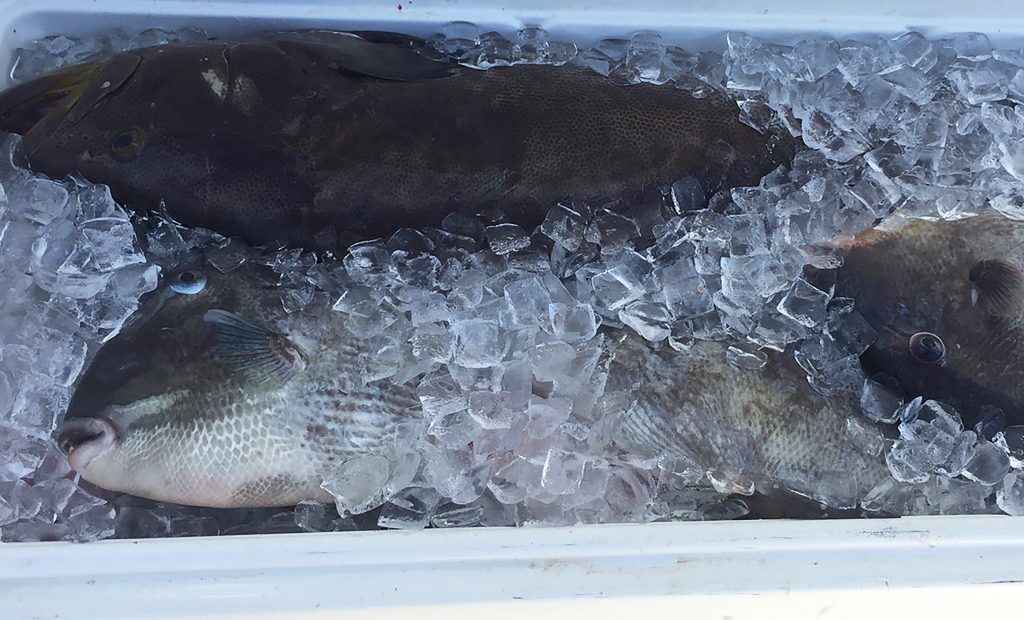March 06, 2018
By Florida Sportsman Editor
How to care for your catch and wow your dinner guests.
 Gag grouper and triggerfish are buried in ice to ensure the best tasting fillets.
Gag grouper and triggerfish are buried in ice to ensure the best tasting fillets.
Not many of us treat our meat fish as we should, and there are steps you can take to improve the dinner you make for your family.
First off, understand it's the blood and body fluid that make fish taste “fishy.” Generally speaking, pelagic and other bloody fish such as red snapper taste stronger than deep water bottom fish whose flesh is firmer and carries less blood than most shallow water species. That doesn't mean there's not a lot you can do to make your fish taste better.
For starters, you need to understand that fish bruise just like you do. Drop a fish to the deck, and you'll often be able to see the bruises afterwards at the cleaning table. A bruise is nothing more than blood rushing to the site of an injury to help the healing process.
Secondly, learn to bleed most of the fish you catch. I never really thought about bleeding anything but tuna, until I hooked a gag grouper one day, and his back third was stolen by a barracuda. I am telling you that was the whitest meat, best tasting gag grouper ever. Now I can't tell you every fish we catch gets bled, but I will tell you that we take far better care of what we keep than we ever thought of 20 years ago, and there's no question we are eating better fish.
The whole process starts with ice. We usually carry at least 80 pounds of crushed ice in 20-pound bags. When we leave the dock bag number one is broken open and scattered in the box to lower the box temperature. In our area we catch a lot of blackfin tuna, and we're ready when the first one comes aboard. A tiny incision is cut behind each pectoral fin, all the way to the bone. Then a short piece of small diameter rope is looped around the tail, and it is dropped back overboard to pump blood out while we set back up, putting our baits out. Once the fish is no longer pumping blood, it is buried in crushed ice in an upright position as if it was swimming. This keeps the last of the blood from settling on either side. Only in the last few years have we started making the same cuts on mahi and wahoo. I was recently shocked when we were wrapping up a trip during which we had done pretty well on blackfins, but had been pestered all day by bonito. While we cleaned up, the mate prepared us all a platter of sashimi. I was gobbling my umpteenth piece when the mate informed me it was bonito. It was great. I would have never believed it if I hadn't tried it. Obviously it had been bled like a blackfin.
Once the fishing is done, the box is emptied, and the fish are layered with the ice in between each layer of fish. Fish are much easier to fillet when they are ice cold, as the meat is firmer. I always make sure to leave the plug out of my cooler. I want my fish to ride home either packed in ice, or a saltwater slush. Fresh water makes their flesh soft, so I don't want them soaking in melted ice.
It's not only offshore fish that benefit from bleeding. I live on one of the great flounder and redfish spots in Northeast Florida. When I catch a red or flounder I will poke my finger through the soft skin beneath the gill cover and pull out the jugular vein. Blood's gonna squirt, but the meat will be white when you clean it.
As for filleting fish, I have a method which gives me the best-tasting fillet possible. I always work my fillet knife down to the ribcage and around it. That way, I never allow stomach acids and other contents to come in contact with my fillets. Make sure you spend the extra dollars to get a good fillet knife. Learn how to sharpen it, and keep it sharp. I prefer a stiff blade, but I know some great fish cleaners who insist on a flexible blade.
It's also best to get on the cleaning chores quickly. Resist the urge to rack up catches and let them warm up in the sun while you shoot pictures. Instead, take a few fish out of the box, fillet them and then take a few more out. Some fishermen pull the skin off the fish (common practice with dolphin), but I prefer to slice the fillet away from the skin. I raise the knife about an eighth of an inch off the skin and make my cut. That way, all the membrane and much of the red meat stay with the skin, and don't end up on the dinner plate.
Finish off your fillet by cutting out the center line bones and any remaining red meat. I'm betting you and your crew will love the improvement on your dinner table. FS
First Published Florida Sportsman Magazine March 2017

